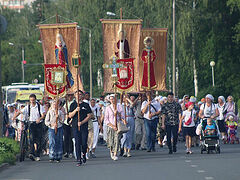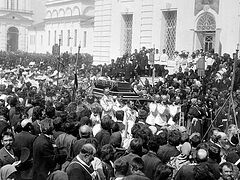The sweet April air enveloped everything around it, clouding the mind and proclaiming the triumph of life. Flocks of melodious birds were playing in the branches of fragrant apple trees, knocking off snow-white velvety petals of blossoming flowers. And the sun was shining so affectionately that you wanted to wrap yourself up in its rays and live, live, live! But he was dying, lying in his mother’s callused arms, strong from unwomanly work. He was dying quietly, as befits angels...
The little boy was three months old. He was born very weak and was not living, but surviving. Throughout her pregnancy the woman had worked on a cargo barge, doing hard work unthinkable for a woman, and even more so during pregnancy. Her duties included carrying buckets of coal and throwing coal into the barge firebox. The post-war years were a heavy burden on the shoulders of the entire nation—there were no exceptions. There, on that barge, in midwinter, she gave birth to her first child. It was immediately clear that the baby would not live long, but the mother’s heart believed that life would not leave his fragile warm body. However, the time came when the baby stopped eating, became very weak and could barely moan in a thin, infant voice. Horror crushed the young mother, pressing on her maternal heart. She knew the end was near. So, in her grief, the woman went out with her son in her arms on that beautiful, life-filled spring day.
Sitting on the mound of earth around her house, the woman started crying. Tears would not stop flowing, falling right on the face of the baby, who did not react to them in any way. The woman wiped them carefully, admiring her son’s cherished face and trying to keep these last moments in her heart. “Is he sick?” the woman trembled at the voice of an unknown old man who suddenly appeared before her. Gray-haired, he was dressed in a shapeless white garment. A white beard was the first thing that caught her eye; and his eyes, his eyes—with a slight squint and such radiant kindness! A lump formed in the woman’s throat, and she so wanted to share her sorrow with the old man, but she could not answer without bursting into tears. She just began to sob... And the old man was standing, leaning on his wooden staff, without taking his eyes off the dying baby. “Enough, enough crying. Your son will recover. Listen to me: Take some cognac, mix it with sweet tea and give the child a teaspoonful three times a day. He will recover!”
Wiping away her tears, as the woman was gathering her strength to answer, the old man left, or melted into thin air... But no one saw him in the village before or after that.
As the days passed, the woman observed carefully the wonderful old man’s instruction, and the child was getting better before her very eyes. The miracle was so incredible that she told everyone about it, and her heart so wanted to thank the wonderful old man, but she did not know how or where to find him.
Life went on its usual way. Now the woman had three sons, but the eldest was the most affectionate and obedient of them all, and the first to help her. At that time few young people knew about God; and this woman, brought up in an anti-religious spirit, was also far from Him. Nevertheless, the moment came when she visited church just out of curiosity. The church was empty, the service had already ended, and several candles, were crackling and burning down in a homemade candle stand filled with sand. The candles were cheap, made of paraffin, so they burned quickly and melted profusely, the wax dripping down into the sand. There were few icons in the church, and the walls, once beautifully decorated with Gospel stories, were entirely painted over, and only in some places were some letters and faces of saints visible. The woman was about to leave, but some inner feeling did not let her just go away. “I’ll buy a candle or something,” she thought. Taking a candle, the woman hurried to put it on the nearest candlestick, as if fearing that someone would see her. The flame started spluttering, gaining strength. Putting the candle in the loose sand, she looked up and froze in surprise. That same old man was looking at her—with a gray beard, snow-white hair, the same eyes with a slight squint, and even white garb! “It's him! It’s him!” Surging feelings excited her heart. The same lump returned to her throat and she burst into tears—this time of great gratitude and love for the old man on the icon. The woman, beside herself with joy, walked up to the candle desk and in an excited voice asked the old woman who worked in the church: “Who is depicted on the icon? Maybe some priest who serves or served here? Where can I find him?”
“No, my dear! That is Father Seraphim, the Wonderworker of Sarov,” the old woman replied.
We could finish the story here, but further circumstances provide some explanation for such a merciful appearance by St. Seraphim himself to this unbelieving woman.
As the years went by, the boy grew up, matured and married. And in his late thirties, he and his wife came to believe in God, began to go to church and travel to holy sites once a year. And their favorite pilgrimage site was Diveyevo, where St. Seraphim of Sarov’s relics rest. Gradually they became ever more attached to Diveyevo, and at some point, the whole family moved to St. Seraphim—to live and work in his convent. The man was an experienced crane operator, and his skills were useful in the reviving convent. In addition to the construction of its claustral buildings and household facilities, he helped restore the churches, installed memorial crosses, and worked at the holy springs. But then, after a few more years, the man fell ill: He developed brain cancer. For four months he lay in bed, unable to get up or move, like a little baby, slowly fading away. Every three days priests from the convent would come and give Communion to the dying man.
Spring came, the first green leaves appeared, and trees began to dress in their wedding attire. Birds started chirping joyfully again, and the sun lovingly warmed every creature of God. Life was gaining strength again, as on that April day many years before. The Paschal season with its earthly and heavenly choirs gradually faded, and took our little boy... That’s how he died—on an April day, only sixty years later. Thanks to the wonderful Elder Seraphim.
This story is real. My grandmother, Anastasia, told it to me. Her child was my father, Yuri. They lived in the south of Russia. In the early 2000s, they moved to Diveyevo. My father died in April 2014, and his grave is in the Diveyevo cemetery.





